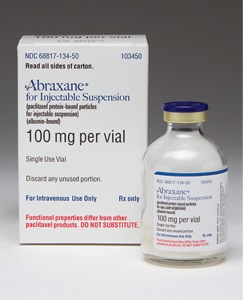For the first time in nearly eight years, a new treatment for metastatic pancreatic cancer has met FDA approval, Celgene announced in a press release on Sept. 6. The FDA approved the company’s drug, Abraxane (paclitaxel protein-bound particles for injectable suspension) (albumin-bound) as a first-line treatment for patients with metastatic adenocarcinoma of the pancreas, in combination with gemcitabine.
 Photo courtesy of Celgene |
“For more than 15 years, treatment with gemcitabine has been the standard of care in this disease,” said Jean-Pierre Bizzari, MD, executive vice president ofhematology and oncology for Celgene Corporation. “The addition of Abraxane to gemcitabine demonstrated meaningful improvements across key efficacy outcomes, including overall survival, with a well-characterized safety profile.”
The FDA had previously approved Abraxane to treat metastatic breast cancer and non-small cell lung cancer.
“Historically, patients with pancreatic cancer have not experienced benefit with many of the drugs so useful in other malignancies,” said Margaret A. Tempero, MD, director of the Pancreas Center at the University of California, San Francisco, in a press release. “The combination of Abraxane and gemcitabine represents an important new therapeutic option for patients with pancreatic cancer.”
The results of the open-label, multicenter randomized Phase III trial, MPACT (Metastatic Pancreatic Adenocarcinoma Clinical Trial), that established Abraxane’s safety and efficacy were presented at the 2013 annual meeting of the American Society of Clinical Oncology. Investigators randomized 861 treatment-naive patients with metastatic pancreatic adenocarcinoma into two groups: Abraxane in combination with gemcitabine (n=431) and gemcitabine alone (n=430). After treatment, patients in the Abraxane plus gemcitabine group had a statistically significant higher median overall survival compared with patients in the group that received gemcitabine alone (8.5 vs. 6.7 months, respectively; P<0.0001). Additionally, median progression-free survival of patients in the Abraxane plus gemcitabine group was significantly longer compared with patients in the gemcitabine-only group (5.5 vs. 3.7 months, respectively; P<0.0001).
Abraxane is a form of the mitotic inhibitor paclitaxel bound to albumin particles. In MPACT, the most common adverse reactions of treatment with Abraxane and gemcitabine were neutropenia, fatigue, peripheral neuropathy, nausea, alopecia, peripheral edema, diarrhea, pyrexia, vomiting, decreased appetite, rash and dehydration.
According to The New York Times (Sept. 6, 2013), Celgene said the cost of Abraxane for patients with pancreatic cancer will be $6,000 to $8,000 per month.
No comments:
Post a Comment